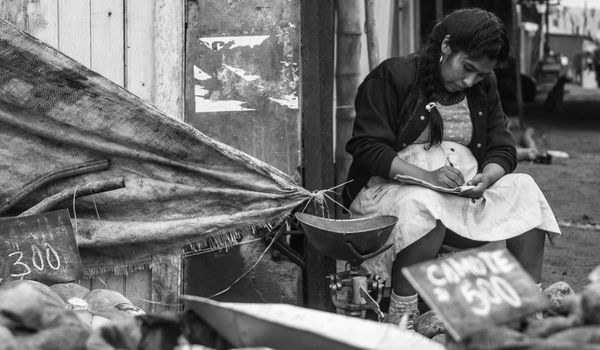Eye For Film >> Movies >> Song Without A Name (2019) Film Review
Song Without A Name
Reviewed by: Jennie Kermode

Georgina (Pamela Mendoza) is in the marketplace, selling potatoes, when she hears the announcement. There’s a new clinic on the edge of town. It’s offering ‘the best free pregnancy care’. Georgina is late in her third trimester and naturally wants the best for her child, so she avails herself of this service. Everything seems good with her pre-natal check up. When she returns to give birth, however, her child is taken away from her. She is given a series of unconvincing and contradictory explanations, then summarily thrown out of the building. When she returns with her husband, all signs of the clinic have disappeared.
Based on real events that took place in Lima in 1988, Melina León’s haunting début feature is shot in square format, in black and white, both of which enhance the impression of poverty created by her images of hillside shacks, soulless concrete buildings and shuffling people who keep their eyes on the ground. Most of these people are indigenous Quechua speakers, second class citizens as far as the Spanish-speaking establishment is concerned. A lack of paperwork makes it difficult for Georgina to get help from the authorities. No-one is inclined to believe a woman like her – until her relentless efforts to find help lead to her meeting a middle class journalist who is also an outsider.

Even today, Peru is one of the most dangerous places in the world to be gay or bisexual. In the Eighties it was even worse. Although he’s in the closet, Pedro (Tommy Párraga) knows what it’s like to be marginalised, to be under threat. His scenes with actor boyfriend Isa (Maykol Hernández) provide the film’s only moments of joy. Immediately empathising with Georgina – showing a simple respect for her humanity that has been notably absent elsewhere – he sets out to try and track down the people behind the clinic.
Alternating between Pedro’s investigations and Georgina’s agonising waiting, this small, heartbreaking story illuminates much bigger issues. Child kidnapping – usually with a view to selling children to adoptive parents overseas who believe them to be orphans – remains a problem in the country to this day, with indigenous people especially vulnerable. The racism and exclusion addressed here remain pertinent issues. The power of León’s work lies in the way that she explores these themes without ever taking her finger off the pulse of the narrative. The ache that Georgina feels in the absence of her child is palpable and always remains in focus.
A vibrant original score by Paucho Sasako mingles with long, melancholy stretches of traditional charango music, giving the film a distinctive character and highlighting the interplay between contemporary and ancient cultural influences. The repetitive nature of a life that begins each day with a lengthy commute through the mountains before squatting on a street corner to make sales is caught up in these rhythms. Everywhere we see dirt and bare rock, scarcely any living thing. It is as if the life, like the colour, has been sucked out of the film with the disappearance of the child, but Song Without A Name has lost none of its power in the process. It’s a film weighted down with sorrow and an affecting tribute to the grief of many mothers, to many children loved and lost.
Reviewed on: 08 Mar 2020
















